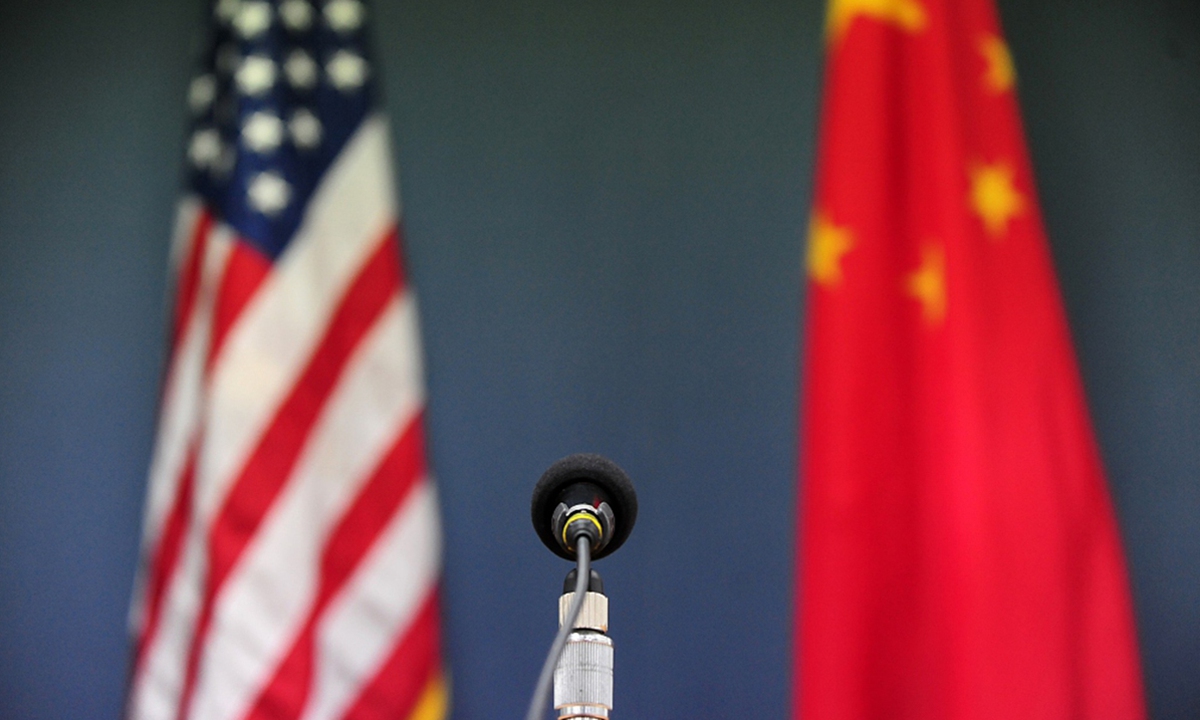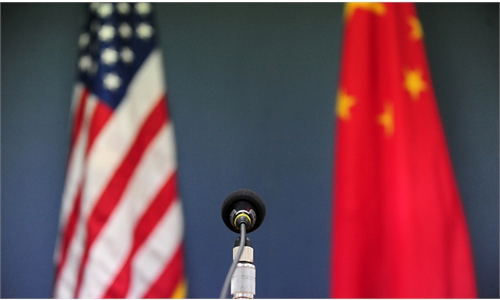China, US ramp up trade dialogue, a 'positive sign of ties returning to normal talk track' despite lingering hurdles

China US Photo: VCG
Following months of notable silence, Chinese and US senior trade officials are ramping up trade talks, as Chinese Vice Premier Liu He held a virtual meeting with US Treasury Secretary Janet Yellen on Wednesday - his second discussion with top economic and trade officials under the Biden administration in less than a week, with both parties underscoring equality and mutual respect as well as the importance of economic ties in bilateral relations, sparking optimism over enhanced communication between the world's two biggest economies as well as caution that significant hurdles still remain intact.
Trade and economic talks on the premise of equality and mutual respect followed after Chinese diplomats dealt vigorous counterblows to US representatives who wanted to speak to China in a condescending way from a position of strength during the China-US Alaska high-level meeting in March.
The increased frequency of talks between senior trade and economic officials signaled that ties are back to the normal trade and economic-talk track. It could be constructive for both sides to exchange their stances on a wide range of issues of dispute, and try to untangle at least certain aspects of the increasingly complex and escalating rivalry, which would inject a certain sense of stability into bilateral ties and confidence for a global economy still reeling from the COVID-19 pandemic, analysts noted.
However, even as China continues to promote bilateral trade and economic cooperation through increased purchase of US goods and services and expanded market access for US businesses, the Biden administration has so far largely maintained the toxic policies carried over from the administration of former president Donald Trump, and has even stepped up crackdowns on Chinese firms, posing serious hurdles for the two sides to resolve disputes and boost cooperation, analysts also pointed out.
Frequent talks
During the virtual meeting on Wednesday - the first between Liu and Yellen since Biden took office in January, the two sides agreed that the China-US economic relationship is "very important," according to a statement published by the Xinhua News Agency.
"The two sides had broad discussions over the macroeconomic situation and multilateral and bilateral cooperation with an attitude of equality and mutual respect and candidly exchanged views on each other's issues of concern," the statement reads, adding that both sides are willing to maintain communication.
The virtual meeting followed Liu's first phone conversation on trade issues with US Trade Representative Katherine Tai on May 27, during which the officials also had candid discussions over issues of concern and agreed to continue talks.
In a statement on Wednesday, the US Treasury Department said that "Secretary Yellen discussed the Biden-Harris Administration's plans to support a continued strong economic recovery and the importance of cooperating on areas that are in [US] interests, while at the same time frankly tackling issues of concern."
The fresh discussion involved comprehensive talks on economic issues, expanding from the trade sector as in the last talk, which sends a clearer signal that economy and trade are still the most prominent area of cooperation between the two countries, which hinges on the strong complementarity of both countries, experts said. The increased frequency of communication between senior officials showed that both sides are ramping up talks to at least exchange views and seek to address specific issues in a pragmatic manner.
"It's such a relief for the economic and business circle to see that China and the US are returning to the normal trade-talk track, which is quite important for bridging bilateral ties," said Li Gang, deputy head of China Association of International Trade under the Ministry of Commerce.
"The second China and US high-level economic and trade dialogue happening within a week showed that the two countries are advancing their originally-planned communications smoothly," Gao Lingyun, an expert at the Chinese Academy of Social Sciences in Beijing, told the Global Times on Wednesday.
"At a time when the direction of China-US trade faces uncertainty, that economic and trade leaders of both sides are conducting very targeted discussions sends a very positive signal," Gao said, adding that more talks could take place in the near future.
"Late but not ineffective. Although the role of trade and economic ties has been somewhat weakened in China-US relations over the past few years, especially after the outbreak of COVID-19 at the start of 2020, it still turned out to be quite necessary and effective," Song Guoyou, deputy director of the Center for American Studies at Fudan University, told the Global Times on Wednesday.
During the recent two dialogues, officials on both sides underscored the importance of bilateral trade and economic ties, though details of the discussions and future plans for talks remain unclear.
Chinese customs data showed that in the first four months of the year, China's trade with the US rose 50.3 percent year-on-year to 1.44 trillion yuan ($222.8 billion). China's exports to the US rose 49.3 percent while imports gained 53.3 percent, and the trade surplus with the US was 653.89 billion yuan, an increase of 47 percent.
Li noted the active role that the world's two largest economies' normalized cooperation could play in lifting the world's economic recovery from the COVID-19 pandemic.
"While there have been no signs of a reversal of the US' policies toward China under the Biden administration from the confrontational strategy of Trump's, neither will they go as provocative in concrete methods as the latter's," Song noted, pointing to a rising trend amid steady advancement in economic and trade ties.
US hurdles
However, despite the rising optimism over enhanced trade and economic talks between Beijing and Washington, analysts cautioned that serious hurdles remain as the US continues to carry out toxic policies from the Trump administration, including punishing tariffs on Chinese products that have inflicted serious pain on US businesses and consumers. Additionally, the US' excessive monetary easing has sparked global inflation worries.
"We should continue to be alert to the US' economic policies and through calm observation, get ready with solutions," Li noted.
In the latest move to pour money into the market, Biden released on Friday its fiscal year 2022 budget, calling for over $6 trillion in total spending in the coming fiscal year to stimulate economic recovery, piling pressure on other countries including China.
Currently, the rising price of raw materials and the strengthening of the Chinese yuan against the US greenback has hit Chinese exports overseas, with the central government mulling measures to hedge the risks.
China's central bank said on Monday that it would raise the amount of money that financial institutions must set aside as reserves for foreign exchange deposits, aimed at curbing the yuan's recent rapid appreciation.
Dong Shaopeng, a senior research fellow at the Chongyang Institute for Financial Studies at the Renmin University of China, said that during the latest virtual meeting, the two sides have likely discussed each other's economic policies and cooperation under the G20.
"The US' demands, including asking China to buy more products and protect intellectual property, won't change much from those during the former Trump administration," Dong told the Global Times, adding that China is concerned about the trend of US monetary policy.
The Biden administration has kept tariffs on Chinese products in place, saying that it would conduct a review on the trade policies, despite growing calls from US industries to lift the tariffs. The administration has moved to crack down on more Chinese firms, including several supercomputing companies. The US' restrictions have seriously dragged down investment.
Compared with better-than-expected trade data between China and the US over the past few months, investment between China and the US last year fell to the lowest level since 2009 amid the pandemic and rising geopolitical tensions, registering $15.9 billion, according to a report issued in May by the Rhodium Group and the National Committee on US-China Relations.
Meanwhile, China has continued to increase purchases of US products and open up more sectors to US and foreign businesses, including in the financial, entertainment and cultural sectors. US financial giants Goldman Sachs and BlackRock have been granted permission for wealth management operations in China. On Tuesday, China said it would scrap limits on foreign ownership of entertainment venues.
Chinese officials have repeatedly called on the US to stop discriminatory actions against Chinese businesses and meet China halfway to resolve disputes and promote win-win cooperation. Analysts noted that as the US and global economy face great difficulties, cooperation with China is paramount.
"The US is facing far more difficulties in healing its wounds from COVID-19 than China is, so it might ask more from China," Gao said. "China has and will respond to those concerns sincerely as a responsible power, which will inject confidence to the global economy."

